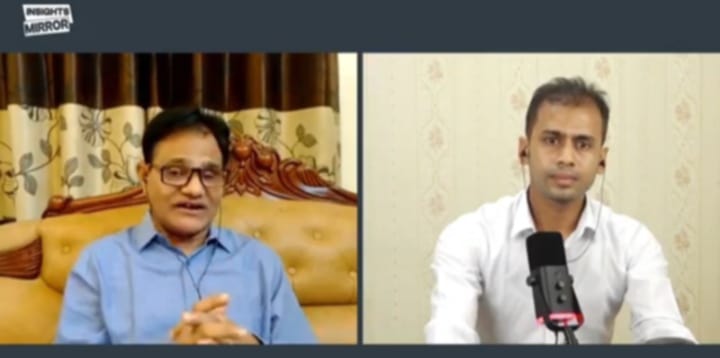In a rapidly transforming Bangladesh, political, social, and economic changes are raising significant questions about the future of education, particularly the evolving relationship between students and teachers. In this week’s Insights Mirror talk show, we delved into the pressing issue of whether the student-teacher bond is deteriorating, and if politics is a root cause.
Key Guests:
Professor Mohammad Habibur Rahman, Former Principal of Rajshahi College
Salahuddin Ammar, Coordinator of the Anti-Discrimination Student Movement, Rajshahi University
Student-Teacher Relationship Under Political Influence
When asked about how politics affected his responsibilities as a principal, Professor Mohammad Habibur Rahman highlighted the challenges of maintaining neutrality in Bangladesh’s educational institutions.
“It is incredibly difficult to operate with complete impartiality in the current context,” Rahman said. “During my tenure, I viewed the student-teacher relationship as one of deep connection, almost like a parent and child. But political involvement, if handled better, could have created a more favorable environment for both students and educators.”
Teacher Dismissals: A Critical Issue
A notable topic of discussion was the recent trend of teacher dismissals, a growing concern across educational institutions in Bangladesh. Salahuddin Ammar, the coordinator of the anti-discrimination student movement at Rajshahi University, responded to whether he supported the way teachers were being forced to resign.
“This issue needs to be looked at from two perspectives,” Ammar said. “If someone is holding onto their position unjustly, then we cannot support that. But the process by which they are removed also requires thorough scrutiny.”

Teachers’ Role in the 2024 Protests
Reflecting on the July 2024 student protests, Professor Rahman was asked whether teachers had an opportunity to stand by their students during the movement. He responded by emphasizing the moral responsibility educators feel.
“When students, who are like our children, are injured, how can teachers remain silent?” Rahman stated. “Although many teachers did not physically join the protests, there was widespread silent support. Over the last fifteen years, this has been a difficult dilemma for the teaching community.”
Student Politics: A Vital Element?
The discussion concluded with a focus on the role of student politics in universities and whether it should continue. Ammar expressed strong views, arguing that politics is inherent to human nature.
“Politics is a fundamental right. When a child cries for food or anything else, that is, in essence, a negotiation—this is their form of politics. What we need, however, is a shift toward intellectual politics, not factionalism,” Ammar said. “We must prevent a recurrence of dominance-driven politics in Bangladesh.
If you want to watch this video, you may click may.

